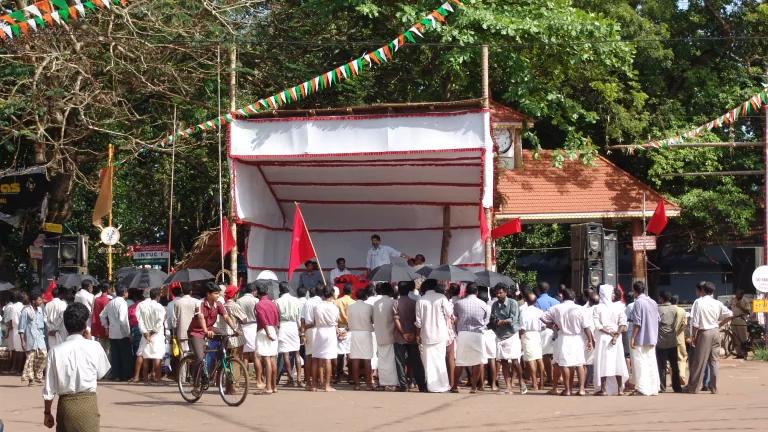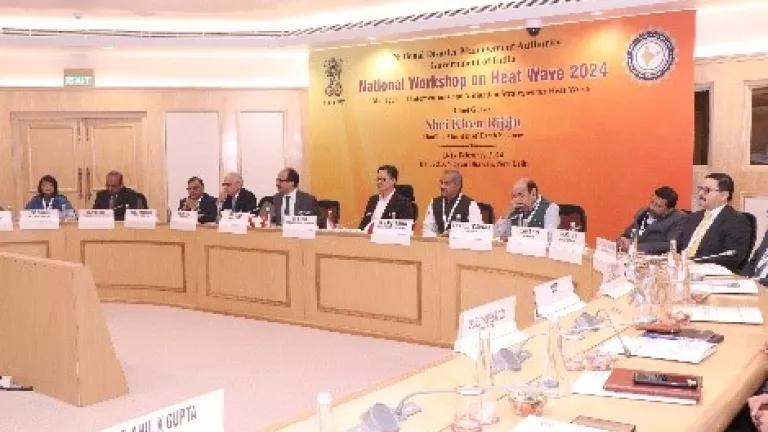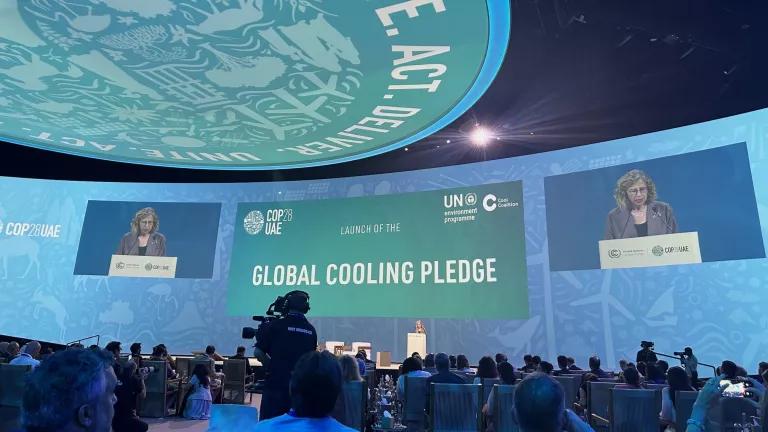The Heat Is On During India’s 2024 General Elections
Millions of people will be contending with dangerous temperatures over the coming weeks as they cast their ballots.

Election campaigning in the 2004 national India elections
Bryce Edwards (via Flickr)
Co-authored by Dr. Ritika Kapoor, Abhiyant Tiwari, and Smriti George of NRDC India
India typically experiences intense heatwaves between March and June each year, and these events impose an extreme burden on public health as well as on the economy at large. Last year’s heat experience in India was challenging, with multiple extreme temperature records broken due to the effects of climate change and El Niño. While last year registered as the second warmest for India, 2024 may offer little relief from these concerning trends. The year’s heat season is a critical period from a public health perspective because it coincides with India's general election, during which more than 900 million eligible voters will cast ballots on seven polling days between April 19 and June 1. As India embarks on its longest-ever election (spanning 44 days) during the sweltering peak of summer, anticipating and addressing the significant adverse effects of heatwaves will be crucial.
This year, India’s summer began with temperatures already surpassing the 40° C mark in parts of Karnataka, Gujarat and Rajasthan, while districts in the state of Kerala observed heatwave-like conditions in March. In some parts of the country, extreme heat is just one of several environmental health threats: the city of Bengaluru (in Karnataka), for example, is grappling with both the highest temperatures experienced in the past five years and a severe water shortage. IMD’s seasonal forecast for March-May 2024 highlights the likelihood of above-normal maximum and minimum temperatures and more heatwave days than normal for most parts of the country:
Heat Hazards May Complicate Voting Process
The 2024 Indian general elections are approaching at a time marking the transition from the prevailing El Niño phase, which typically exacerbates heat and dryness across India due to Pacific warming, to a forecasted La Niña, when the risk of heatwaves persisting in the country will remain significant. The presence of dense crowds and a scarcity of shaded areas on voting days could increase heat-related health challenges. Precautionary measures are warranted given the challenges of last year's heat season, when some casualties were attributed not only to high daytime temperatures (ranging from 34-38°C) but also due to elevated humidity levels.
Improving Heat Awareness and Preparedness
The severe health harms of heatwaves can be reduced by fostering a culture of heat awareness, preparedness, and early reporting of health concerns. Anyone experiencing heat exposure symptoms should seek to promptly report health concerns to medical practitioners who can intervene to reduce harm. This approach ensures timely diagnosis and treatment for individuals, ultimately reducing the strain of extreme temperatures on public health.
Beyond acute emergency response settings, government authorities (including local administrators and hospitals) will play a crucial role in implementing measures during this upcoming election cycle to protect the well-being of voters. Specific actions that local authorities can help to advance are wide-ranging, and include efforts across city and state governance, including risk communication, built environment modifications, stakeholder engagement, health surveillance, and hospital staff preparedness:
- Public Awareness Campaigns: Local public awareness campaigns on extreme heat are being undertaken nationwide, along with the concerned authorities and capacity-building organizations, to educate people about the risks of heat exposure during the elections. These campaigns include dissemination of information through mass media about preventative measures for reducing heat exposures, tips on recognizing symptoms of heat-related illnesses, and guidance on where to seek help.
- Infrastructure Planning: Cities are making new investments in infrastructure to provide shaded areas, hydration stations, and cooling centers at polling stations and other election-related venues. These actions can help reduce the impact of heat on voters and election officials and provide longer-term relief from dangerous heat to communities.
- Healthcare Provision: Extended periods of exposure to intense or prolonged heat can trigger heat stress, which if not adequately addressed can manifest as various heat-related illnesses. These types of illnesses span from minor and easily manageable conditions like prickly heat, heat-related swelling, heat cramps, and heat exhaustion, to severe medical emergencies such as heat stroke. Ensuring that adequate healthcare facilities and medical personnel are available during elections is crucial. Local authorities can facilitate stronger coordination between with healthcare providers to ensure prompt medical assistance is available where and when it’s needed.
- Monitoring and Response: Because India’s general elections are taking place during the summer months, systems for monitoring weather conditions and collecting heat-related health data during the election season can be used to understand how heat hazards are affecting voters. A data-driven approach can help to enable timely responses to emerging risks and target implementation of appropriate measures to safeguard public health.
- Collaboration with Stakeholders: Collaboration between city agencies and other relevant stakeholders, including non-governmental organizations and community groups, can improve the reach and efficacy of government interventions.
Heat Tips for the Election Season
The Election Commission of India (ECI) has already issued a heat wave advisory ahead of the elections based on IMD seasonal forecasts. The ECI provided lists of Heat “Do’s and Don'ts” based on guidance from India’s National Disaster Management Authority (NDMA). Getting the word out about these tips, which are summarized below, can help to minimize risks amongst voters in the weeks to come.
Heat Season “Do’s”
- Stay hydrated by drinking plenty of water throughout the day and carry water to the polling station.
- Wear light-colored, loose-fitting clothes to stay cool.
- Seek shade or use umbrellas when outdoors to avoid direct exposure to the sun.
- Take breaks in cooler areas (cooling center, green or blue spaces), if possible, especially during peak heat hours.
- Use sunscreen to protect against sunburn.
- Keep electrolyte-rich drinks handy or snacks to replenish lost nutrients.
- Be mindful of symptoms of heat-related illnesses and seek medical attention if necessary.
- Follow weekly IMD heat season forecasts to know if there will be heatwave in your region and take preventative measures.
- Sensitize people around you especially the vulnerable population like elderly, children, pregnant women and outdoor workers.
- Keep an eye on heat alerts coming from the local administration.
- Election campaigns, rallies, and the election process itself should be planned with the heat impacts factored in. The IMD will be disseminating heatwave forecasts, which should be watched daily.
Heat Season “Don’ts”
- Avoid prolonged exposure, especially during the hottest time of the day.
- Don’t ignore signs of dehydration or heat exhaustion such as excessive sweating, dizziness, or nausea.
- Don’t leave pets or children unattended in vehicles as temperatures inside can quickly become dangerously high.
- Avoid excessive consumption of coffee or tea as they contribute to dehydration.
Managing Heat Dangers During Election Season
As millions of Indians confront dangerous temperatures to cast ballots during the upcoming election season, public health must be prioritized. Proactive government efforts to prepare for the effects of heatwaves will benefit voters and election officials while helping to highlight the substantial heat risks that are intensifying across the country because of climate change. As Indians navigate an election season that is happening during a period of intense heat, securing the health and safety of all should take priority.




